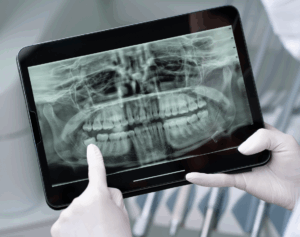
Nov 24, 2025


If you experience gaps closing between your teeth, pain, swelling or pressure in your jaw, pressure between or around your back teeth, looseness in your teeth, pain in your sinus cavity, and even radiating into your ear, it may be time to visit a dentist. The third set of molars, known as wisdom teeth, emerges during late teenage years and early twenties. Their novel name is deceiving though as they tend to create more problems than benefits for numerous people. When your wisdom teeth come in, they often begin to press on your surrounding teeth, pushing them closer together and causing those unpleasant symptoms above. According to the ADA, 60% of wisdom teeth will need to be extracted to prevent symptoms and damage to the surrounding teeth and gums.
The presence of impacted wisdom teeth becomes evident through these symptoms because they grow at unusual angles or stay hidden under gum tissue.
When you are searching for a dentist, it is wise to ensure that the practice you choose:
Once you determine these things, the Dental Practice will schedule an appointment for you, typically an Emergency Exam. This exam ranges in price so be sure to ask about that when you call. The Emergency Exam involves an exam and a series of X-Ray’s, specifically looking at the area you are concerned with. From these images, they will be able to determine if your wisdom teeth need to be extracted, how soon, and what kind of extraction process you will need. If the wisdom teeth are impacted or a more advanced type of extraction is needed, the office may refer you to an Oral Surgeon.
The dentist and their team will also go over your different sedation options, which can vary. Many dental practices offer inhaled Nitrous Gas as a sedation option, but some specialty offices will offer oral sedation, or IV sedation as well. Ask questions and consider the level of comfort you wish to have, what options are covered by your insurance, and what the associated costs are. It’s important to ask these questions if you want a sedation option during the surgical procedure.
Another thing to consider, is how many wisdom teeth you plan to have extracted. Typically they don’t all begin to hurt at the same time. They can come in individually, or all together. It is recommended to remove both upper, both lower, or all 4 at the same time typically, to prevent further pain and damage to the surrounding teeth. Keep in mind, the process of preventive removal produces better results than waiting for more complications to develop.
The failure to remove problematic wisdom teeth results in multiple dental and health complications which include
Typically, wisdom teeth removal takes between 30 minutes and 1 hour per tooth. In some cases, it may take longer if the teeth are impacted or difficult to access. The recovery period for most patients lasts between 3 to 7 days before they can resume their normal activities.

Your healing gums need soft foods which avoid causing any discomfort. The following list includes safe and satisfying food options for your recovery:

The extraction site develops dry socket when the blood clot dislodges from its position. The condition leads to painful symptoms, infection, vomiting, and bleeding which can be avoided through proper care. It is imperative that you avoid smoking, drinking through a straw, and all foods that are hard to chew, crunchy, or spicy for at least seven days so that you do not get dry sockets.
You should contact your dentist immediately when you experience any unusually symptoms, including severe pain, bleeding, fever, nausea, vomiting, or unusual and unpleasant mouth odors as these could be symptoms of infection or dry sockets.
Try rinsing with salt water, applying a cold compress, or taking OTC pain relievers like ibuprofen. If pain persists, you’ll need a dental exam.
The following symptoms indicate an infected wisdom tooth: Swelling, pain, bad taste, pus, fever and limited mouth opening. You should visit a dentist immediately when you notice these symptoms.
Yes! impacted teeth often cause tightness or aches in the jaw, especially when chewing or waking up.
Delaying removal can lead to infections, damage to nearby teeth, cysts, and long-term jaw issues which aren’t fun.

Press ENTER to confirm the appointment